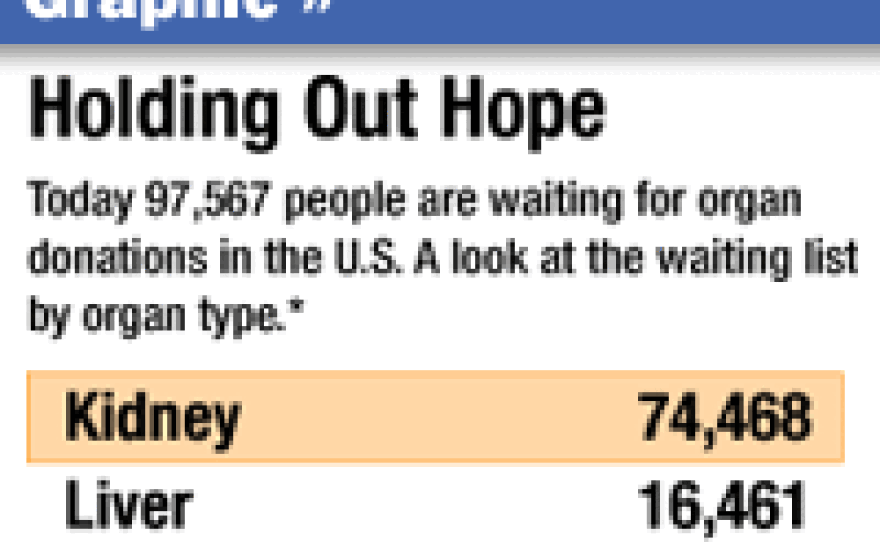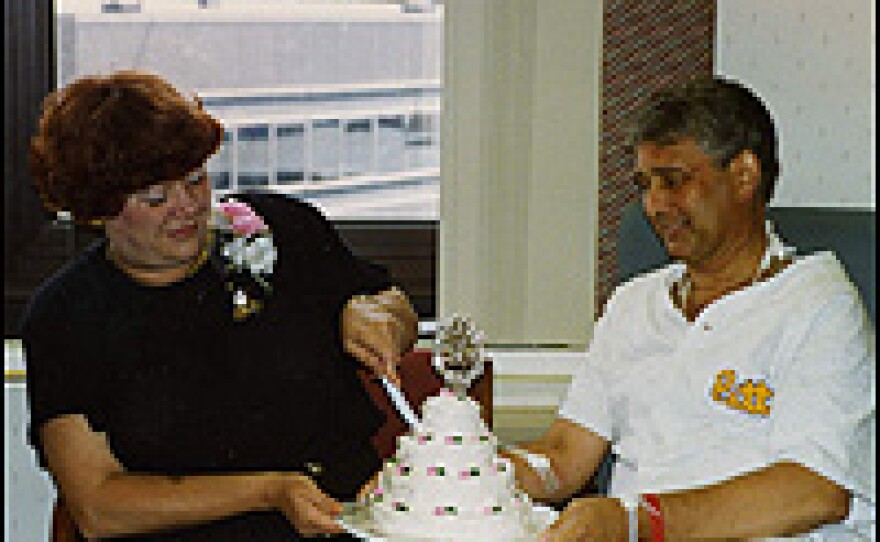

Fifteen years ago, Paul Jewell was living on borrowed time.
Jewell was waiting for a heart transplant at a Pittsburgh hospital after he was diagnosed with ideopathic cardiomyopathy, a condition also known as an enlarged heart. In 1993, he was one of more than 30,000 Americans waiting for an organ transplant.
Today, that number has more than tripled, and there are still not enough organ donors to meet demand. But organ donations are slowly increasing, a trend that doctors and health care professionals hope to build on in the next few years.
The Excruciating Wait
Each year in the U.S., 6,000 people die waiting for an organ that never arrives. Jonathan Murray of Foxboro, Mass., was one of those people. Murray had been waiting on the list for five years before he died of liver disease in 2005. His wife, Nancy, remembers that as her husband got sicker, he was rushed to the top of the list.
But when a liver finally became available, doctors couldn't perform the transplant because he developed an infection and went into septic shock.
"With an infection, even if you're number one, you get bumped off the list. So it's like heartbreaking — you're always on an emotional rollercoaster as a family," she says. "I have three sons and it was very, very hard for them to watch their dad ... just emaciate into a shell."
According to data from the Organ Procurement and Transplantation Network, there are more than 97,000 people like Murray who are currently waiting for organs. Walter Graham, executive director of the United Network for Organ Sharing, says that number will be well over 100,000 by the end of 2009. And while thousands of registered organ donors die each year, Graham says that only a small fraction of their organs will ever be transplanted into another person.
"It's a very small number because traditionally organ donors are individuals who've become brain dead, and there are not that many deaths that occur in that kind of a situation," Graham says.
Brain death provides doctors with a unique opportunity to transplant organs from a patient who is technically dead, but whose organs are still alive. And because those circumstances are so rare, every potential donor is vital opportunity.
Determining Donors
Many U.S. donors come from places like Massachusetts General Hospital's Neuroscience Intensive Care Unit. On a recent day, a dozen patients were in the unit — some had suffered strokes or brain hemorrhages. Others showed the scars of major head injuries. Dr. David Greer, director of in-patient stroke service, says that despite the severity of some of the injuries in the unit, many patients can be treated.
"If they had some degree of functioning, they could have a quite variable prognosis depending on what the underlying cause is," Greer says. "If somebody has pressure on the brain we can release — if they have some bleeding on the brain we can evacuate — that might be a recoverable illness."
But other patients — such as those who suffer irreversible brain damage after a heart attack — can't be treated. Neurologists see patients with a wide array of neurological functioning, but it's only a certain subset — those who have little to no brain function — who qualify as organ donors.
Brain-dead patients suffer a catastrophic and irreversible loss all of all brain function. They can't breathe on their own, and their hearts can't bring oxygen to their organs without drugs. But while those patients are medically deceased, their organs are not, and doctors use ventilators to preserve their organs for transplantation.
"We try to have the doctors separate out so we're not seen as vultures who would swoop in and say 'OK, I'm done treating your patient now, can we have your organs?' I mean, that sounds extremely gruesome," Greer says.
Filling a Need
Federal law requires that decisions about allocating organs are left to regional organ procurement organizations, or OPOs, which keep up-to-date information on patients' vital statistics and whereabouts. Sean Fitzpatrick, director of public education at the New England Organ Bank, says most of the potential donors that they track aren't listed as organ donors on their driver's licenses. In fact, only 30 percent of New England residents have registered as organ donors on their licenses, Fitzpatrick says.
When a patient hasn't registered as an organ donor — as is the case with all five of the patients Fitzpatrick's bank is tracking on a recent day — the decision of whether to donate is left to the patient's family.
It's an excruciating decision that Massachusetts General's Greer says he sees families struggle with all the time. At that point, Greer says his job as a doctor goes beyond just healing the brain.
"If you can do a good family conversation in a crucial time, that makes such a tremendous impact for them and for their ability to understand and to heal and move on," Greer says.
Doctors work with organ banks and other hospitals to learn how to help grieving families navigate the delicate decisions about organ donation. By sharing information among each other and presenting it to families, the medical community has found that they can make a positive impact on what families ultimately decide to do with their loved one's organs. In fact, in the past three years, there has been a 25 percent increase in organ donations from deceased donors.
A Critical Lifeline
Paul Jewell's heart came when he least expected it.
The Pennsylvania man, who was waiting for a heart in 1993, finally got it on October 6 that year. Jewell says he wheeled his heart machine to the hospital cafeteria for dinner, sat down and started to eat.
"The nurse came up behind me and said, 'Do not take another bite.' At that point in time, they said 'We think we found a heart,'" he recalls. "It was about 5:30 in the evening, and by 9 that night, they were wheeling me down in the O.R. to prepare me for surgery."
Jewell's heart came from a 23-year-old male college student. He says he doesn't know about the circumstances of his donor's death, only that it was a tragedy.
Jewell says it's difficult to express exactly what the gift meant to him.
"When you have an opportunity to know that you now have had a chance in your life to see events that you otherwise would not have had — to have seen my children both get married, to see four grandchildren come into the world — I can't ever come up with proper wording to express thanks and appreciation," he says.
Copyright 2022 NPR. To see more, visit https://www.npr.org. 9(MDAzMjM2NDYzMDEyMzc1Njk5NjAxNzY3OQ001))






